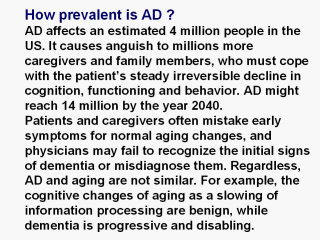| front |1 |2 |3 |4 |5 |6 |7 |8 |9 |10 |11 |12 |13 |14 |15 |16 |17 |18 |19 |20 |21 |22 |23 |24 |25 |26 |27 |28 |review |
 |
Early and accurate diagnosis can prevent the
use of costly medical resources and allow patients and family members time
to prepare for future medical, financial and legal costs. The primary risk factors for AD are age and family history. Genetic mutations on chromosomes 1, 14 and 21 cause rare early-onset familial forms, and the apolipoprotein E-4 (APOE-4) allele on chromosome 19 is associated with increased risk of common late-onset AD. Nonetheless, the APOE-4 allele also is found in elderly persons without AD and is not present in many patients with the disease. Genetic testing for APOE is not recommended for predictive screening in asymptomatic persons, and experts disagree on its usefulness as a diagnostic test in dementia. Female sex and lower education level have higher risks. Protective factors include the use of estrogen replacement therapy and nonsteroidal anti-inflammatory drugs. Neither epidemiology nor genetics provide the concrete evidence that is desired. |